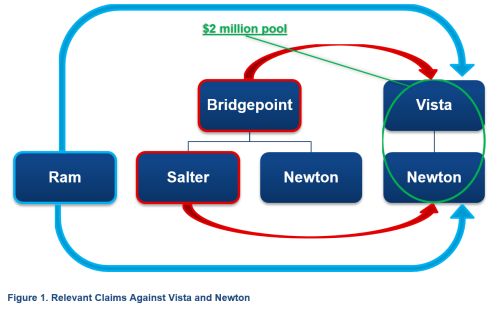Peter Jarvis is a partner in Holland & Knight's Portland office
Trisha Rich is a partner and Lisa Mon'a Kpor is an associate in Holland & Knight's Chicago office
HIGHLIGHTS:
- In Bridgepoint Construction Services, Inc. v. Newton, et al., the California Court of Appeal recently affirmed a trial court's decision to disqualify an attorney from representing multiple clients who all sought damages from the same pool of the defendants' assets.
- To the extent that the case involved former client conflicts, the attorney could have avoided this outcome if he had proper conflict waivers and limitations on the scope of representation in place. To the extent that the case involved current client conflicts, the argument that conflicts waivers would be sufficient to allow the attorney to continue is much less clear.
- The court also reiterated that an attorney will be subject to disqualification in the context of successive representation when there is a substantial relationship between the subject matter of the two representations or when the attorney obtains confidential information while representing the former client that is relevant to the representation of the current client.
In Bridgepoint Construction Services, Inc. v. Newton, et al., 26 Cal.App.5th 966 (Cal. Ct. App. 2018), the California Court of Appeal recently affirmed a trial court's decision to disqualify an attorney from representing multiple clients who all sought damages from the same pool of the defendants' assets.
Background
The Court of Appeal decision on this motion to disqualify counsel was entered following a series of complaints, cross-complaints and related lawsuits regarding a construction project in Santa Barbara, Calif. Bridgepoint Construction Services Inc. and one of its shareholders, Norman Salter, instituted an action against Vista Oceano La Mesa Venture LLC and one of Vista's shareholders, Martin Newton. Newton also happened to be a shareholder of Bridgepoint. Bridgepoint and Salter alleged that Vista, Newton and others owed them about $2 million for construction services. Vista filed a cross-complaint against Salter and Dilip Ram, one of Salter's business associates, alleging that Salter and Ram diverted assets from Bridgepoint, which allegedly also deprived Vista of moneys due to it.
Robert Klein appeared as counsel of record for Bridgepoint, Salter and Ram. During the course of his representation, Klein designated an expert to review Bridgepoint's financial records. Based on his review, the expert determined that Bridgepoint was owed $2 million for the construction project. Klein was disqualified from serving as counsel for Bridgepoint and Salter because the two parties were adverse to one another with respect to indemnity and other claims. As a result, Bridgepoint was required to retain new counsel.
In February 2017, Klein filed a cross-complaint on behalf of Ram against Vista and Newton. Most notably, the damages sought by Ram were a portion of the $2 million that Bridgepoint and Salter sought in their complaint against Vista and Newton. Klein was also serving as counsel for Bridgepoint and Salter in a related case against a third party in Arizona. Months later, Bridgepoint's new counsel filed a cross-complaint against Salter and Ram for conversion, self-dealing, breach of fiduciary duty and other claims.

Grounds for Disqualification
Bridgepoint filed a motion to disqualify Klein from representing Ram. The trial court granted the motion and determined that Klein had two distinct conflicts. One conflict arose out of the simultaneous representation of Bridgepoint in the Arizona case and Ram in this action. The other conflict existed due to Klein's successive representation of Bridgepoint and Ram in this case. Klein appealed, contending that the trial court erred in disqualifying him.
The California Court of Appealoutlined three circumstances that lend themselves to potential disqualification. In instances where an attorney simultaneously represents two clients with adverse interests, disqualification is automatic unless, at a minimum, all clients give informed consent. In addition, where an attorney represents a current client against a former client and a substantial relationship exists between the subject matter of the two representations, the attorney will be subject to disqualification. Finally, where an attorney obtains confidential information in the course of representing a former client that is relevant to the representation of a current client, disqualification is mandatory.
Ruling and Reasoning
In applying these legal principles to the case, the court found that there were multiple independent grounds for disqualifying Klein. First, Klein simultaneously represented Bridgepoint in the Arizona action and Ram in the present California case. Although Klein was not suing Bridgepoint or Salter in the California case, their interests remained adverse, as they were both seeking the damages from the same limited pool of money belonging to Vista and Newton. Every dollar that Ram obtained from the $2 million pool would be a dollar that was not available to Bridgepoint or Salter. Under these circumstances, disqualification in the absence of waivers was automatic. (See Figure 1.) Second, Klein obtained confidential information from Bridgepoint when he retained an expert witness on its behalf to review Bridgepoint's financial records. It was therefore mandatory for the court to disqualify Klein because the confidential information he obtained would be relevant to his representation of Ram. Third, Klein was subject to disqualification because there was a substantial relationship between the subject matter of Klein's former representation of Bridgepoint and his current representation of Ram.
Practical Implications
To the extent that this case is viewed as involving former client conflicts, Klein could have avoided disqualification if he had obtained adequate conflict waivers based on informed client consent.
To the extent that this case is viewed as involving the representation of two current clients seeking recovery of claims that exceed the total amount available to pay them, the argument for allowing Klein to proceed on behalf of both current clients is less clear. Even if the two clients' cases are legally distinct cases, the situation as a whole can be said to be one in which the lawyer is representing two different claimants who are suing each other in the same case for offsetting recoveries.
The content of this article is intended to provide a general guide to the subject matter. Specialist advice should be sought about your specific circumstances.

